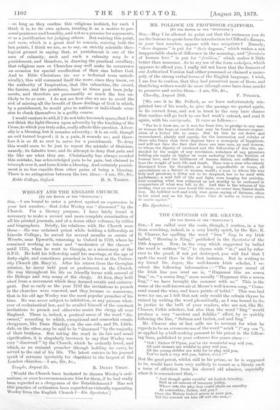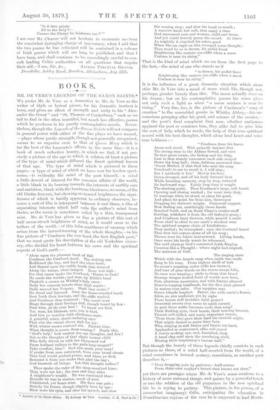THE CRITICISM ON MR. GRAVES.
[To TIIE EDITOR OF THE " SPECTATOU.1 am called over the coals, though, I confess, in a far from scorching, indeed, in a very kindly spirit, by the Rev. E. D. Cleaver, for spelling the word " linn " /mg, in my Irish ballad, "Herring is King," published in the Spectator of the 19th August. Now, in the song which suggested by ballad the word is written " lin'," to rhyme with "in ;" and by refer- ence to the proof, if not yet destroyed, you will find that I spelt the word thus in the first instance. But in writing to my friend Dr. Joyce, the well-known Irish scholar, I re- ceived the following information :—" The proper sound of the Irish line you send me is, " Hugamar fein an eowra ling," or, "a sowra ling," more usually " Hugamar fi5in a sown, ling," "we have brought the summer with us." This is the name of the well-known air of Moore's well-known song, " Come send round the wino, and leave points of belief." This was bad news for me, as I felt that not only would the refrain rhyme be ruined by writing the word phonetically, as I was bound to do, in justice to the bulk of your readers, who are not, like Mr. Cleaver, Celtic scholars, but also that the word " ling " would produce a very "ancient and fishlike" effect, by so quickly following the lino, "Salmon and turbot, cod and ling."
Cleaver also at last calls me to account for what he regards to be an erroneous use of the word" avick " (" my son "), as applied by a bull-making peasant to his priest in the follow- ing lines, published in your columns five years since :—
" Och ! Father O'Flynn, you've the wonderful way wid you, All ould sinners are wishful to pray wid you,
All the young childer are wild for to play wid you, You've such a way wid you, father, avick " But the good priest, whilst still in his prime, as he is supposed to be, would have been very unlikely to resent as a liberty such a term of affection from his shrewd old admirer, especially when it is remembered that,— " And though q.uite avoidin' all foolish frivolity, Still at all salsons of innocent jollity,
Where wds the play-boy could claim an equality At comicality, father, wid you ? Once the Bishop looked grave at your jest, Till the remark set him off wid the rest,—
Is it lave gaiety All to the laity P—
Cannot the Clergy be Irishman too I"" I am sure Mr. Cleaver will not hesitate to exonerate me from the somdwhat damaging charge of inaccuracy, when I add that the two poems he has criticised will be contained in a volume of Irish poems Which will ere long be published, and that I have been, and shall continue to be, exceedingly careful to con- sult leading Celtic authorities on all questions that require
.900?1,10.21a, AAley Road, Bowdon, Altriucham, Aug. 27th.































 Previous page
Previous page